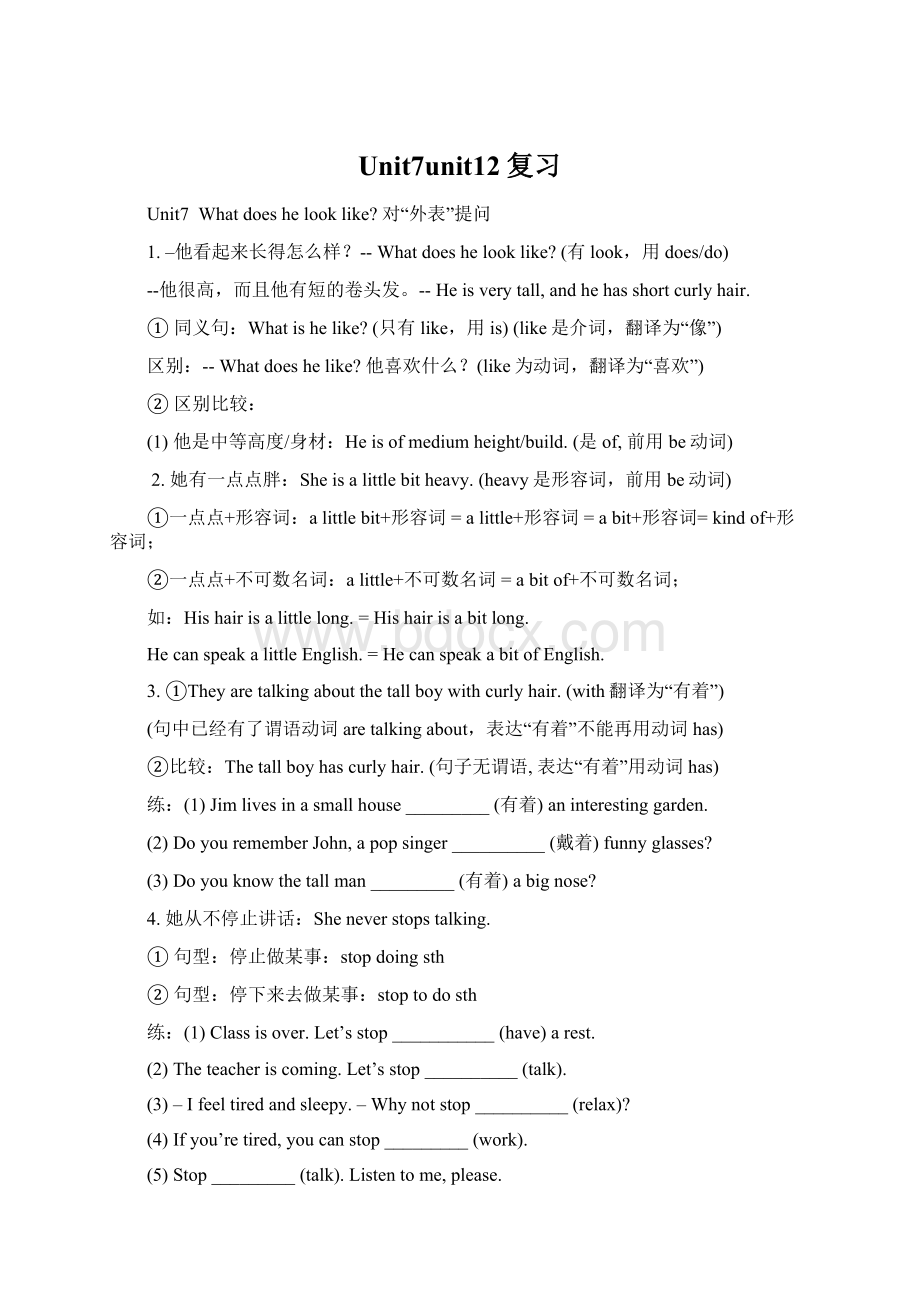Unit7unit12复习Word下载.docx
《Unit7unit12复习Word下载.docx》由会员分享,可在线阅读,更多相关《Unit7unit12复习Word下载.docx(13页珍藏版)》请在冰豆网上搜索。

(1)Classisover.Let’sstop___________(have)arest.
(2)Theteacheriscoming.Let’sstop__________(talk).
(3)–Ifeeltiredandsleepy.–Whynotstop__________(relax)?
(4)Ifyou’retired,youcanstop_________(work).
(5)Stop_________(talk).Listentome,please.
5.他不再戴眼镜了:
Hedoesn’twearglassesanymore.
词组:
不再…:
not…anymore
戴眼镜:
wearglasses
穿一条红色的裙子:
wearareddress
穿着某种颜色的衣服:
in+颜色如:
Doyouknowtheboyinblack?
6.没有人知道我:
Nobodyknowsme.
语法:
someone,somebody,everyone,everybody,nobody均表示“三单”,与之搭配使用的动词也要变“三单”。
(1)Everyoneinmyclass__________(know)thissmartteacher.
(2)Doyouthinkeveryone__________(enjoy)theirweekends?
(3)Everyoneinourclass_______theweekend.
A.enjoysB.enjoyC.enjoyedD.enjoying
7.在七年级五班:
inClassFive,GradeSeven(班级、年级、数字的“首字母”均需大写)
8.篮球队的队长:
thecaptainofthebasketballteam(有of,需要倒翻)
①有“生命”的东西,表示“的”用’s;
如:
Heismyfather’sfriend.
②无“生命”的东西,表示“的”用of.如:
Hereisaphotoofmyfamily.
9.形容人的“外貌特征”的名词和形容词
序号
跟在be后(be+形容词)
跟在have/has后(have/has+名词)
1
是高的/矮的istall/short
有长/短头发havelong/shorthair
2
是中等高度isofmediumheight
有直/卷头发havestraight/curlyhair
3
是胖的/瘦的isheavy/fat,thin
有黑/黄头发haveblack/yellowhair
4
是中等身材isofmediumbuild
have+长短+直卷+颜色+hair头发
5
是长的/短的islong/short
haveabeard有胡子
6
是漂亮/丑陋的isbeautiful/ugly
have(two)bigeyes有两个大眼睛
7
是可爱的iscute
有一张圆脸:
havearoundface
10.受某人的欢迎:
bepopularwithsb受欢迎的:
popular
对某人友好:
befriendlytosb友好的:
friendly
11.讲笑话:
tellajoke,telljokes讲故事:
tellstories
12.有一副新的面貌:
haveanewlook(此处的look作“名词”)
13.去买东西:
goshopping
14.
(1)lookv.动词“看起来;
”
Helookslikehisfather.他看起来像他的爸爸。
Shelooksveryyoung.她看起来很年轻
(2)lookatv.动词“看”Lookatthepicture.
(3)lookn.名词“外表;
”如:
Hehasanewlook.
15.
(1)likev.喜欢;
Whatdoeshelike?
Helikesapples.
(2)likeprep.像;
Unit8I’dlikesomenoodles.
1.--你想要什么?
--Whatwouldyoulike?
=Whatdoyouwant?
--我想要一些面条:
--I’dlikesomenoodles.=Iwantsomenoodles.
句型:
想要某东西:
wouldlikesth=wantsth(后跟名词,不加to)
想要做某事:
wouldliketodosth=wanttodosth(后跟动词,加to)
(1)Doyouwant________?
A.speakEnglishB.tothenewpantsC.hohomeD.togotoschool
(2)Wouldyoulike________(drink)somegreentea?
2.餐厅英语:
我能帮您吗?
--CanIhelpyou?
=WhatcanIdoforyou?
=Whatwouldyoulike?
--我想要一些面条。
--I’dlikesomenoodles.(I’d=Iwould)
–你想要什么种类的面?
--Whatkindofnoodleswouldyoulike?
--我想要牛肉番茄面。
--I’dlikebeefandtomatonoodles.(注意用“单数”)
–你想要多大碗的面?
--Whatsizebowlofnoodleswouldyoulike?
--我想要一中碗面。
--I’dlikeamediumbowlofnoodles.(一中碗…)
什么种类:
Whatkind什么尺寸:
Whatsize
一大/小碗面条:
alarge/smallbowlofnoodles
3.--你想吃些东西吗?
--Wouldyoulikesomethingtoeat?
--(接受)好的:
--Yes,please.
(拒绝)不,谢谢。
--No,thanks.
--Wouldyoulikesometea?
--________.
A.Yes,IwouldB.Yes,pleaseC.No,Idon’tD.No,please
4.我要买它:
I’lltakeit.(此处的“买”不能用buy,只能用take)
5.那是全部吗?
好了吗?
完了吗?
--Isthatall?
6.特色菜一15个饺子只要10元\:
Special1isjust(only)10RMBfor15dumplings.
7.some+不可数名词(无复数,不能加s),作句子主语时,动词用“三单”。
some+可数名词变复数(有复数,加s),作句子主语时,动词用“复数”或“原形”。
(1)Somechicken_____(be)inthebowl.Someeggs_______(be)onthetable.
(2)I’dlikesome_______and_______.
A.porridge,vegetablesB.beef,tomatoC.Frenchfries,orangejuices
8.“肯定句”的两者或两者以上用“and”连接:
I’dlikedumplingsandorangejuice.
“否定句”的两者或两者以上用“or”连接:
Idon’tlikegreenteaorporridge.
9.肯定句中表达“一些”用some;
否定句、疑问句中表达“一些,任何”用any;
特殊情况:
wouldyoulikesome……?
是委婉语气,some不用变为any
(1)Iwouldlikesomebeefnoodles.
(2)Iwouldn’tlikeanychickennoodles.
(3)Ididn’thave_______moneyforataxi.
10.关于“人称代词”的用法:
(1)实义动词后的“人称代词”用宾格;
Canyouhelpme?
Hedoesn’tlikethem.
(2)介词后的“人称代词”用宾格;
Doyouwanttogowithus?
11.吃某东西当早餐:
eat/havesthforbreakfast
12.句型:
某人/某东西怎么样?
:
Whataboutsb/sth?
做某事怎么样?
Whataboutdoingsth?
Whatabout=Howabout
14.一碗:
abowl一大/中/小碗:
abigbowl,amediumbowl,asmallbowl
一大/中/小碗…:
abig/medium/smallbowlof…两大碗:
twobigbowlsof…
一杯绿茶:
acupofgreentea
15.在饺子店:
atthehouseofdumplings=atthedumpinghouse
在甜品屋:
atadesserthouse/shop
16.一些很棒的特色菜:
somegreatspecials
特色菜1:
Special1
17.
(1)drinkv.动词“喝;
Whatwouldyouliketodrink?
(2)drinkn.名词“饮料;
”(复数+s)如:
Colaisakindofdrinks.
18.
(1)kindof+形容词有点;
(无形式变化)如:
Heiskindoflazy.
(2)akindof+名词一种;
Englishisakindoflanguages.
(3)kindsof+名词多种;
Therearemanykindsoflanguagesintheworld.
Unit9Howwasyourweekend?
1.表示“发生在过去的动作”,要用一般过去时,句中常含表示“过去”的时间。
一般过去时的结构:
主语+动词过去式。
翻译时加上“…了”。
(不管主语是“单数”还是“复数”,动词始终用“过去式”)
表示过去的时间标志词:
last+month/year/week/weekend;
twodaysago;
yesterday;
in+过去的年份;
(1)He_________(go)toschoolonfootyesterday.
(2)–WhatdidJimdo?
--He_________(go)tothemovies.
(3)We___________(notgo)tothecinemalastSunday.
2.–你上个周末做了什么?
--Whatdidyoudolastweekend?
(did引导,动词还原)
--在星期天上午,我打了网球。
--IplayedtennisonSundaymorning.
在上午/下午/晚上:
inthemorning/afternoon/evening
在星期天上午/下午/晚上:
onSundaymorning/afternoon/evening
在上个星期天上午:
/lastSundaymorning(前不用冠词)
在上学的白天/晚上:
onschooldays/nights
3.–Tina的周末怎么样?
--HowwasTina’sweekend?
--它很棒:
Itwasgreat.–它还不错:
Itwasnotbad.–它很糟糕:
Itwasterrible.
4.该是回家的时候了:
It’stimetogohome.
该是做某事的时候了:
It’stimetodosth
5.Hespenthalfanhour_________(play)computergameslastnight.
某人花费时间在某事上:
人+spend+时间+onsth
某人花费时间做某事:
人+spend+时间+doingsth
6.句型:
What/Howaboutdoingsth?
Whataboutsb/sth?
你怎么样?
Whataboutyou?
7.常用do,does,did,don’t,doesn’t,didn’t代替前文提到的动词。
(省略句)
(1)–Whocleanedtheroom?
--Mike________.
A.wasB.doesC.isD.did
(2)Idon’tthinkheissogreat,butmymother_______.
(3)PetervisitedhisEnglishteacherthismorning,butTony_______.
A.isn’tB.wasn’tC.doesn’tD.didn’t
(4)IlikeSportsNewsverymuch.–_______.
A.Ilike,tooB.Ido,tooC.Idon’tlike,eitherD.Idon’t,either
(5)MyfatherlikesSportsNews,butmymother_______.
8.去爬山:
gotothemountains去海滩gotothebeach(beach变复数+es)
去看电影:
gotothemovies看电影:
seeamovie=watchamovie
去图书馆:
gotothelibrary
去散步:
goforawalk散步:
takeawalk
9.待在家里:
stayathome
10.为考试而学习:
studyforthetest=studyforexams
11.举行派对:
haveaparty
12.阅读:
dosomereading
类似:
dosomeshopping;
dosomecooking;
dosomewashing;
dosomecleaning
14.练习英语:
practiceEnglish
练习做某事:
practicedoingsth
15.过了一个繁忙的某末:
have/spendabusyweekend(此处的have翻译为“度过”)过去式:
had/spentabusyweekend
16.读一本关于历史的书:
readabookabouthistory(此处的about翻译为“关于”,=on)
17.带某人去某地:
takesbto+某地
19.
(1)last最后的;
在最后一张照片里:
inthelastphoto
(2)last上一个;
(前无介词)
上个星期:
lastweek上个月:
lastmonth去年:
lastyear
20.
(1)spend度过;
Howdoyouspendyoursummerholidays?
(2)spend花费;
Hespenttwohourscleaninghisroom.
21.
(1)for“对…来说;
对大多数的孩子来说:
formostkids
(2)for“为,给;
为我烧晚饭:
cookdinnerforme
Unit10Wheredidyougoonvacation?
1.--你去了哪里度假?
--Wheredidyougoonvacation?
(go是实义动词,前用did引导)
--我去了夏令营。
--Iwenttosummercamp.
--你玩得开心吗?
--Didyouhaveagoodtime?
(have是实义动词,前用did引导)
--是的。
Yes,Idid.
度假:
onvacation玩得开心:
haveagoodtime=havefun=enjoyoneself
2.我们很高兴在水里玩:
Wehadgreatfunplayinginthewater.
很高兴做某事:
have(great)fundoingsth
在水里:
inthewater(介词用in)
3.它有点无聊:
Itwaskindofboring.
有点:
kindof=alittle+形容词
4.我发现一个小男孩正在角落里哭:
Ifoundasmallboycryinginthecorner.
发现某人正在做某事:
find(found)sbdoingsth
看见某人正在做某事:
see(saw)sbdoingsth
在角落里:
inthecorner(介词用in)
Wefoundhersister__________(read)Englishinherroom.
5.他迷路了:
Hewaslost.或某物丢失了
6.那让我感觉很高兴:
Thatmademefeelveryhappy.
让某人做某事:
makesbdosth=letsbdosth
感觉很高兴:
feelveryhappy
Thefunnystorymakesus_________(laugh)alot.
Let’s__________(讨论)thisquestionfirst.
7.我们决定走着回宾馆:
Wedecidedtowalkbacktothehotel.
决定做某事:
decidetodosth.
走着回宾馆:
walkbacktothehotel走回家walkbackhome(home前无介词)
Hisfatherdecided__________(buy)anewcomputerforhim.
8.考与“一般过去时”配套使用的时间:
(1)–Wasyourfatheratwork_______?
--Yes,hewas.
A.lastweekB.everymonthC.thisyearD.nextMonday
(2)–Whendidyouseehim?
--_______.
A.NextMondayB.TwohoursC.InanhourD.Anhourago
9.去纽约市:
gotoNewYorkCity(go的过去式went)
去中心公园:
gotoCentralPark
去夏令营:
gotosummercamp
去博物馆:
gotothemuseum参观博物馆:
visitthemuseum
studyforexams(study的过去式studied)
11.什么也没有做:
donothing(nothing指“什么也没有”)
--Doyouhaveanythingelsetosayaboutthetrip?
--No,_______.
A.anythingB.nothingC.somethingD.everything
12.整天:
allday整夜:
allnight整日整夜:
alldayandallnight
13.
(1)lookfor寻找(强调“找”这个过程);
(2)find找到(强调“找到”这个结果);
Helookedforhis